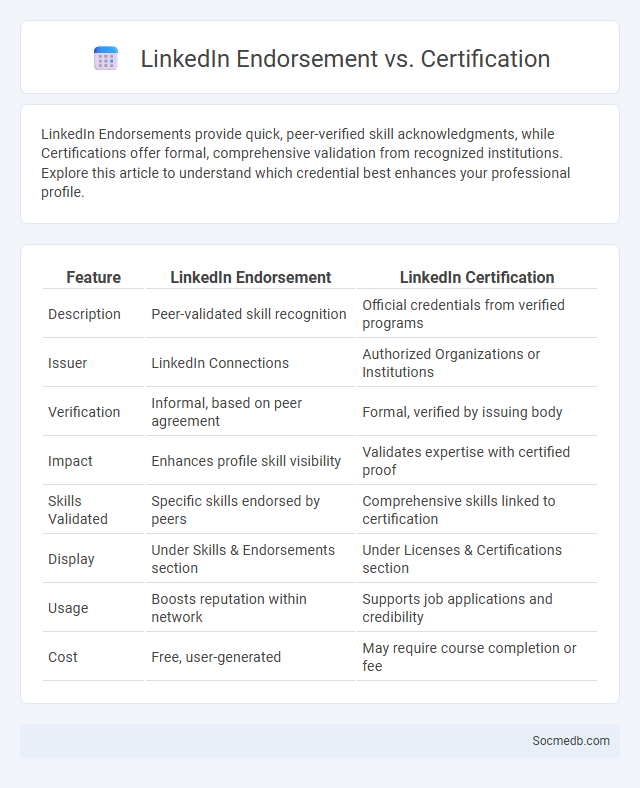
Photo illustration: LinkedIn Endorsement vs Certification
LinkedIn Endorsements provide quick, peer-verified skill acknowledgments, while Certifications offer formal, comprehensive validation from recognized institutions. Explore this article to understand which credential best enhances your professional profile.
Table of Comparison
| Feature | LinkedIn Endorsement | LinkedIn Certification |
|---|---|---|
| Description | Peer-validated skill recognition | Official credentials from verified programs |
| Issuer | LinkedIn Connections | Authorized Organizations or Institutions |
| Verification | Informal, based on peer agreement | Formal, verified by issuing body |
| Impact | Enhances profile skill visibility | Validates expertise with certified proof |
| Skills Validated | Specific skills endorsed by peers | Comprehensive skills linked to certification |
| Display | Under Skills & Endorsements section | Under Licenses & Certifications section |
| Usage | Boosts reputation within network | Supports job applications and credibility |
| Cost | Free, user-generated | May require course completion or fee |
Understanding LinkedIn Endorsements
LinkedIn endorsements are a valuable feature that allows users to validate each other's skills, enhancing professional credibility and visibility. Receiving endorsements for specific competencies increases profile rankings in LinkedIn's search algorithm, attracting recruiters and potential employers. Strategically requesting and giving endorsements can build a stronger, more trusted professional network on the platform.
What Are LinkedIn Certifications?
LinkedIn certifications are digital credentials earned by completing professional courses and assessments on LinkedIn Learning or through partner organizations, showcasing verified skills to recruiters and industry peers. These certifications enhance user profiles by demonstrating specific expertise in areas such as project management, data analysis, or digital marketing, improving job prospects and professional credibility. Employers increasingly value LinkedIn certifications as proof of up-to-date knowledge and commitment to continuous learning in a competitive job market.
The Difference Between Endorsements and Certifications
Endorsements on social media involve individuals or influencers publicly supporting a product or service based on personal use or opinion, often reflecting a subjective experience. Certifications represent formal recognition or approval by an authoritative organization, validating that a product, service, or individual meets specific standards or qualifications. Understanding the distinction between endorsements and certifications helps consumers make informed decisions by differentiating personal recommendations from verified credentials.
How Endorsements Work on LinkedIn
Endorsements on LinkedIn enhance your professional credibility by allowing connections to validate your specific skills, making your profile more attractive to recruiters and potential employers. Each endorsement reflects a peer's acknowledgment of your expertise, contributing to higher visibility in LinkedIn's search algorithms. Leveraging these endorsements effectively can boost your networking opportunities and strengthen your personal brand within your industry.
The Value of Third-Party Certifications
Third-party certifications establish credibility and trustworthiness for social media platforms by verifying data privacy and security standards, which enhances user confidence. These certifications, such as SOC 2 or ISO/IEC 27001, demonstrate compliance with industry best practices and regulatory requirements, reducing risks associated with data breaches. By highlighting verified certifications in their operations, social media companies can attract more users and advertisers seeking assurance of platform integrity and responsible data handling.
Credibility: Endorsements vs. Certifications
Endorsements from influential social media personalities can boost brand credibility by leveraging trust and relatability within target audiences. Certifications from recognized institutions provide verifiable proof of expertise and quality, reinforcing consumer confidence in products or services. Balancing endorsements and certifications enhances overall credibility, combining emotional appeal with objective validation.
Which Has Greater Impact on LinkedIn Profile?
Your LinkedIn profile's visibility and engagement are significantly influenced by the quality and relevance of your content, including posts, articles, and interactions within your network. Optimizing your profile with strategic keywords in headlines, summaries, and experience sections enhances searchability and attracts the right professional audience. Consistent activity, such as sharing industry insights and engaging with connections, drives higher impact compared to a static or incomplete profile.
How to Get More Endorsements on LinkedIn
Boost your LinkedIn endorsements by strategically showcasing your skills through an updated and detailed profile that highlights your expertise. Engage with your network by endorsing others' skills first, which encourages reciprocal endorsements that validate your professional abilities. Regularly share relevant content and participate in group discussions to increase visibility and credibility, prompting connections to endorse your skills authentically.
Tips for Highlighting Certifications Effectively
Showcase your certifications prominently on your social media profiles, using clear and professional images or badges to attract attention. Incorporate keywords related to your certifications in your bio and posts to improve searchability and highlight your expertise. Share success stories, case studies, or relevant experiences that demonstrate how your certifications have enhanced your professional skills and value.
Best Practices: Combining Endorsements and Certifications
Combining endorsements and certifications strengthens your social media credibility by showcasing verified expertise alongside positive peer recognition. Highlight reputable certifications from industry leaders and pair them with authentic endorsements to build trust and enhance your professional profile. This strategic blend increases engagement and demonstrates authoritative knowledge that resonates with your audience.
 socmedb.com
socmedb.com